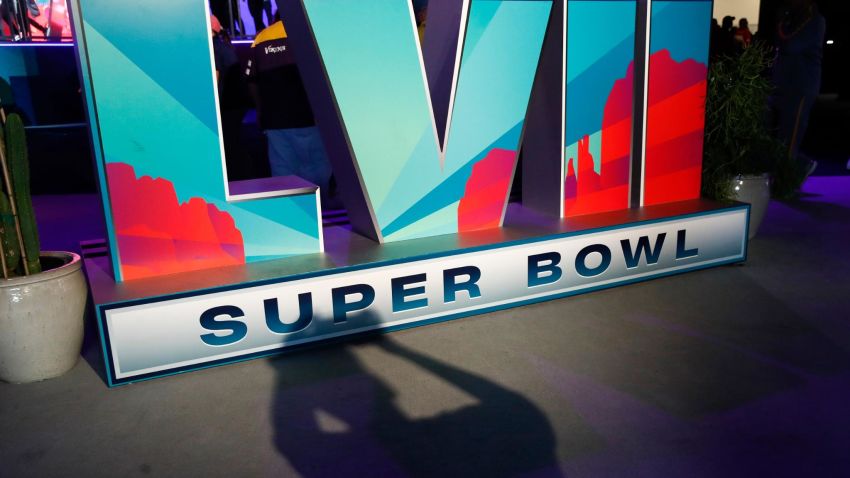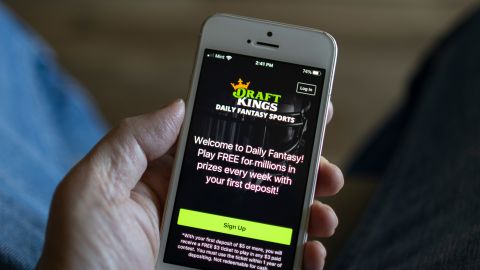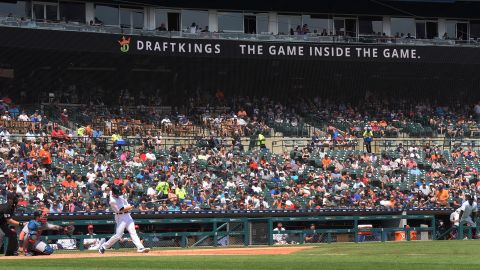New York
CNN
—
The sports gambling gold rush is coming at a high cost.
In 2018, the Supreme Court struck down a federal ban on commercial sports betting in most of the country. Thirty-three states have made sports gambling legal in the wake of the decision. Now, on Super Bowl Sunday, a record 50.4 million US adults are expected to bet on the game.
The booming sports betting industry, lawmakers and even the professional sports leagues themselves are making it easier, faster and more tempting for people to bet on games — and develop gambling problems, say gambling researchers and addiction specialists.
A flood of advertising, technology that allows for one-click betting at home, and nearly unlimited betting options during games have collided. There’s been a spike in inquiries to state gambling-addiction hotlines, states say.
In the past five years, there has been an explosion of online sports betting apps from companies like DraftKings, FanDuel and Caesars. These apps are often replacing illegal betting venues. At the same time, they also attract an influx of new gamblers who had never set foot in a casino or would have known how to place a bet with a bookie.
During the Super Bowl, there will be an onslaught of advertisements — most starring celebrity sponsors and athletes — meant to encourage new sign-ups and grab market share. DraftKings will air a commercial featuring Kevin Hart and David Ortiz, while Rob Gronkowski will attempt a field goal kick live in a FanDuel ad. (Any customer who places a Super Bowl bet of five dollars or more on FanDuel will win a share of $10 million in “free bets” if Gronkowski makes it.)

Hear why FanDuel CEO thinks this Super Bowl will be biggest day in company’s history
Sports teams and leagues were once fiercely opposed to gambling on the games. Now, they’ve partnered with sportsbooks.
These days, gamblers can also do much more than wager on the outcome of a game. There are options to bet in-game on every quarter, player, and event.
Resources for gambling addiction programs have long been thin in the United States and have been stretched further by the current wave of sports betting. In 2020, there were 5.7 million Americans with a gambling disorder, according to a nationwide survey by the National Association of Administrators for Disordered Gambling Services.
Focus on gambling disorders has historically been minimal in the United States, said Timothy Fong, a psychiatrist and the co-director of the UCLA Gambling Studies Program.
This is in part because people with gambling disorders have been viewed as foolish or lacking willpower, he said. “We equate the ability to hold onto money and win money with success and equate losing with greed.”
There is also sparse federal oversight of the gambling industry, and there are currently no federal funds designated for problem gambling treatment or research, unlike federal funding for alcohol, tobacco and drug addiction programs.

A patchwork of state legislation, lack of robust consumer protections in many states, and limited advertising restrictions are adding to the problems.
“Many states naively or some other way went about legalizing sports betting without adequately estimating the costs on problem gambling resources,” said John Holden, an associate professor of management at Oklahoma State University who studies sports gambling regulation.
“There is more that state lawmakers can do within the confines of commercial speech restrictions,” including authorizing extra funding to go after false and misleading advertising, Holden said.
Betting on sports can be a way for some people to develop, maintain or accelerate gambling disorders.
There are several features of sports betting that make it different from other forms of gambling and can lead to addictive behavior.
Many sports bettors tend to perceive their wages on games are safer and more informed by their own expertise and skills than luck, researchers say. This may give them a false illusion of control.
Additionally, live betting within games reduces the delay between risk and reward, and it’s increasing the speed and frequency of wagers, experts say.
“I got caught up in a lot of the live betting,” said one 24-year-old man with a gambling disorder who spoke to CNN on the condition of anonymity. He started betting on sports seven years ago through a bookie, but upped his wagers once he started using apps.
During football games, he would bet on the outcome of drives and which team would score the next touchdown. As he lost more during a game, he would try again to to win it back on the next play.
“You see the way the game is going and you think you know,” he said. “It’s not like back in the day with a bookie betting on who wins.”
He said he lost $100,000 on sports gambling, including money from student loans. He’s currently in recovery at Beit T’Shuvah, in Los Angeles, which provides inpatient and outpatient services for people struggling with gambling disorders.
Casey Clark, the senior vice president at the American Gaming Association, a trade group for the gambling industry, said that the legalization of sports betting has moved the black market of sports gambling into regulated marketplaces, benefiting states.
The gambling industry and sports betting operators work with regulators, professional sports leagues, media companies and advocates to set standards, provide gambling education for consumers and fund recovery efforts for people seeking treatment, Clark said.
“We’ve had a really fast escalation and movement towards giving American consumers access to the legal market that they clearly want. And so we have to continue to evolve that marketplace,” he said.
Advocates for people with gambling disorders say demand for help and treatment services has grown alongside the rapid expansion of legalized sports betting.
Inquires to the Council on Compulsive Gambling of New Jersey’s help hotline about sports gambling have increased 60{2c3a8711102f73ee058d83c6a8025dc7f37722aad075054eaafcf582b93871a0} since it became legal in the state in 2018, said Felicia Grondin, the organization’s executive director.
Grondin feels helpless against the constant barrage of advertising encouraging betting on games.

“We consider it to be predatory advertising because it’s incessant and it glamorizes gambling,” she said.
Clark from the American Gaming Association said the group has created a responsible marketing code to set industry-wide advertising standards.
But self-enforcement by the industry cannot make up for robust oversight from regulators, said Keith Whyte, the executive director of the National Council on Problem Gambling.
“Self-regulation tends to dumb itself down to the lowest common denominator, not the highest,” he said. “Some operators are definitely taking advantage of weak regulatory environments in some states.”
Every state where gambling is legal has a regulatory body that oversees it.
But few have “really done more than the minimal amount to increase funding of problem gambling treatment,” said Holden. The sports gambling industry is most similar to financial markets, he said, but financial markets are much more regulated than banks.
Most states require that sports betting ads disclose the minimum legal age to gamble and responsible gambling messages, such as problem gambling hotlines. Those messages are brief and usually run at the very end.

Regulators are wary of how tightly they can curtail messages in gambling advertising without running afoul of First Amendment protections on commercial speech.
“A lot of state regulators have big First Amendment fears,” Holden said. “No one wants to fund litigation or lose a Supreme Court case over gambling.”
In most states, the legal age for sports betting is 21 years old. But ads during games, in stadiums, and with star athlete sponsors normalizes sports betting for kids and teenagers, critics say. The United Kingdom last year banned top athletes and celebrities from appearing in ads endorsing or promoting gambling to try to curb underage gambling. That’s unlikely to happen in the United States.
Additionally, researchers are troubled by the incentives and promotions some sports betting apps often provide to users, such as sign-up and referral bonuses, promo codes and bonus bets. One 2017 study of people with gambling addictions found that messages with an offer of risk-free kind of bonuses had a high impact.
The Ohio Casino Control Commission in January fined DraftKings, Caesars and BetMGM $150,000 each for advertising promotions or bonuses as “free” or “risk-free” when, in fact, users were required to lose money or risk their own money to obtain the promotion.
“I got more incentive to gamble with these apps that give you free play and match your deposit,” said the former sports bettor in Los Angeles currently in recovery. He enlisted friends to sign up to get referral fees, and looked at these enticements as free money. “I’d have to be an idiot to pass this up.”






